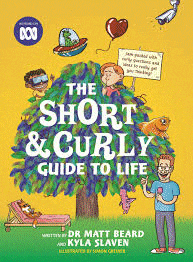
The Short & Curly Guide to Life
The Short & Curly Guide to Life
Dr Matt Beard & Kyla Slaven
Simon Greiner
ABC Books, 2018
192pp., pbk., RRP $A24.99
9780143792185
While helping students develop their information literacy skills is a critical part of enabling them to investigate the world around them, it is what to then do with what they learn that can be tricky. As we teach them to be critical consumers of information we also need to help them be creative users of it, to interpret it in new situations, to view it from a different perspective, to ask “what if…” and to develop new knowledge and understandings.
Short & Curly is a podcast from the ABC aimed at 7-12 year-olds which asks short and curly questions about the world around them, focusing on ethics, the strand of philosophy that focuses on what is right and wrong and encourages thinking about “what should I do?”
In this print edition, using the Brains Trust – Arjun, Rabia, Koa, Sophia, and Mae – who are a team of young researchers who identify, observe and try to answer ethical dilemmas that face our students, the book puts forward a number of scenarios that demonstrate some of these issues like lying, being happy, learning, making choices, letting go, being fair, making promises, and so on. Each scenario is presented as a report rundown, a summary of the situation, which is accompanied by questions that focus thinking on the best way to handle the situation. Dr Matt responds with some ideas and poses some bigger questions that can be applied to a broader range of contexts, encouraging the reader to think about the situation from a variety of perspectives rather than just their own experience and then consider what they would do in that situation.
Philosophy and ethics seem like grown-up concepts on the surface, unlikely to have a place in the primary curriculum, but when they are expressed in the context of the everyday situations that children encounter such as whether it is OK to lie to protect someone’s feelings, it becomes much more practical and doable so this book is perfect for guiding the children’s development in this area, setting up discussions that allow a lot of perspectives and opinions to be aired in a calm, objective way, compromises to be made and solutions to be negotiated. Not only does the classroom offer a forum for a wider variety of voices than the student’s family values, such discussions lay the foundations for calm, reasoned, evidence-based debates in the future as the students mature, are more able to cope with thinking on an abstract level and face bigger community-based issues as well as their own personal ones.
While each scenario is a standalone within its pages, there are now many picture books that deal with the focus themes so using these in conjunction with each discussion would be value-adding in a significant way. For those struggling with the Ethical Understandings strand of the Australian Curriculum, this is a solid base for your program, one that will reach far beyond both the classroom and a particular academic year.